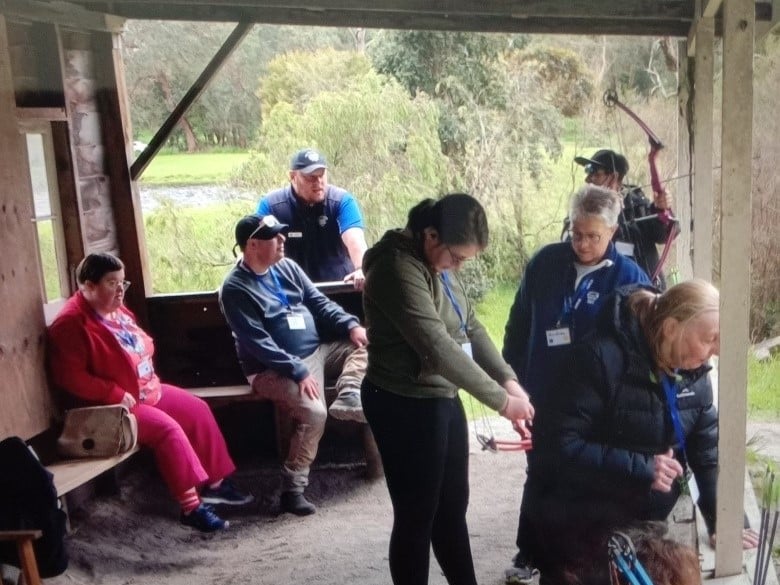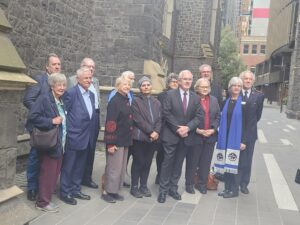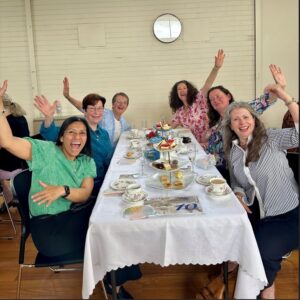
Jenan Taylor
1 December 2022
For more than 15 years, disability carer Janet Kilpatrick has been driving residents of the group houses where she works to a friendship club at All Saints’ Greensborough.
The club is where adults who have an intellectual disability get the chance to gather, make friends and worship God.
Ms Kilpatrick says many of the residents she’s cared for don’t get to spend much time outside of the homes. Most also no longer have families or the loved ones they grew up with, so the club is a chance for them to be with people with whom they’ve made heartfelt connections.
“When they see each other, they relax, they laugh, they dance, they sing, they love it so much. And they always come home uplifted,” she said.
Initially started in a parishioner’s loungeroom more than 30 years ago, about 25 people gather at the club, held in the All Saints’ church hall on a Friday evening and Sunday afternoon each month.
Participants are aged in their late 20s and upwards. One member started going shortly after the initiative started, and has just turned 94-years-old.
Read more: Accessibility not a ‘matter of special privilege’: Culhane
The club’s appeal may be that it revolves around some much-loved, steady routines, its organisers say.
Coordinator Michele Pilmore said there was always Bible study, a lesson and songs of worship.
In addition, Friday gatherings comprise supper, the chance for participants to share news about their lives, and more hymns. Sundays also involve the group sitting down to lunch together after reflecting on the month’s lessons and yet more singing.
“They seem to love the regularity of the program, the fellowship, and the singing so much. After the services there’s always someone heading off in the car with their carer, still belting out the hymns,” Ms Pilmore said.
She also believes the program works because the lessons and Scripture readings are delivered at a level that the participants can grasp easily and that encourages them to follow along and ask questions.
The group gets to attend external events, sometimes in partnership with other denominations, and there is an annual camp, as well.
Volunteer Janie Beasley agrees that sticking to a pattern has been crucial for building and solidifying relationships with participants – as well as their carers.
“Some have come to sit with the participants and have over time come know the routine, too,” Ms Beasley said.
That extended the church’s opportunity to build connections with the carers too, and so ensuring good communication with them was also key to the program’s success, she said.
Ms Beasley said that included keeping the carers well apprised of happenings, and regularly furnishing them with a calendar of planned activities and events.
Still, plenty of challenges including mobility and logistics issues abound for the disability ministry. The COVID pandemic, of course, has added to the difficulties for everyone.
Read more: How an uplifting priesthood began with the simple act of listening
Ms Kilpatrick said the club was one of the things her residents missed the most.
“They kept asking when we were going to get to go to the friendship club, because they have a long history with people there. It was really sad for them,” she said.
Ms Beasley said the coordinators put together care packs for the participants to try to bridge the gap between the in-person gatherings and keep some semblance of a routine going.
Since the easing of lockdown arrangements, they also strived to keep the club get-togethers as safe as possible.
Nonetheless, the hurdles keep coming, Ms Pilmore says.
Some participants are vulnerable to illnesses and the group is ageing, so the club is at a stage where it needs to recruit more members. This has been particularly difficult.
“The pandemic has meant that the residential houses have been very strict about what the residents can and can’t do. So, we’ve got to find a way to approach new houses and get some younger members. We have tried asking them to bring friends but that hasn’t worked. We don’t really have answers on how we can do it,” Ms Pilmore said.
But Ms Kilpatrick believes the friendship club is invaluable for the residents she cares for because they’re often treated differently to everyone, and excluded from so many groups.
“It’s one of the few spaces that they’re not being criticised for not talking properly, or for just standing there, and it’s a social event,” she said. “So, I think they get a sense of freedom from it and the chance to feel a part of something, a part of a big family where their talents and skills are worthwhile, even if perhaps they can’t talk.”
For more faith news, follow The Melbourne Anglican on Facebook, Twitter, or subscribe to our weekly emails.







